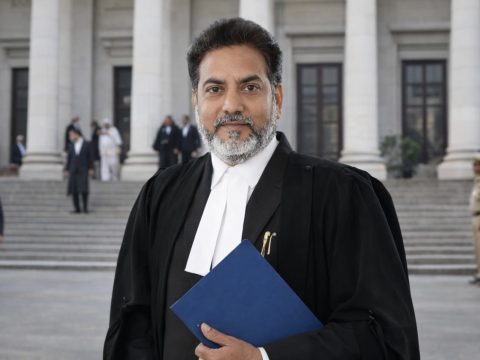
SECTION 138 OF NEGOTIABLE INSTRUMENTS ACT
December 25, 2023
Section 24 of Hindu Marriage Act, 1955
January 23, 2024Khula under Muslim Law
Introduction-
The media is praising a recent ruling by two Kerala High Court justices that recognised a Muslim woman’s entitlement to Khula, and it is seen as a progressive ruling that advances the cause of gender equity in Islamic law. The Kerala High Court’s single bench decision in K.C. Moyin v. Nafeesa (1972) exposed the debate. It was decided that Muslim marriages cannot be dissolved at the request of women in any situation, and that Muslim women do not have the right to an extrajudicial divorce. Consequently, the ruling eliminated the divorce options accessible to women in accordance with Islamic law. But occasionally, a partnership could not be happy and could even cause problems for them both. The Quran gives the choice of divorce in such cases. Muslims in India are subject to Sharia law, which is based on the Quran and Hadith, rather than any formal legislation on divorce.
The Shariat Act of 1937 acknowledged four categories of divorce under Islamic law:
- Talaq: When a husband unilaterally declares his divorce to a wife in front of witnesses, it effectively becomes a divorce.
- Khula: The divorce at the wife’s request upon Mahr’s return or subject to any other requirements that may be stipulated.
- Mubarat: A divorce granted with both the husband and the wife’s permission.
- Faskh: When one party approaches the court, a divorce is formally announced.
Over time, there has been a serious misinterpretation and distortion of Khula law. The 1976 ruling, which has since been overturned, declared the woman’s right to an extrajudicial divorce through Khula and Mubarat under the Act to be unlawful. The Kerala High Court’s current ruling has reinstated the proper standing under Islamic law.
The idea of Khula is to provide women an option to end a marriage in the event of an unworkable separation. Its goal is to defend and uphold women’s rights within the bounds of Islamic law.
Muslim law allows women to divorce their marriage in secret through the use of Faskh as well as Khula or Talaq-e-Tafweez. The Dissolution of Muslim Marriages Act 1939 governs divorce proceedings in India; nevertheless, the Act has no bearing on the fundamentals of Muslim law pertaining to Khula and Talaq-e-Tafweez, as they fall beyond its purview.
What is Khula?
Both parties to a marriage have the legal right to divorce or dissolve it under Muslim law, but this right can only be used in the most dire circumstances—that is, when there is no chance of a reconciliation. Men and women have the same freedom to end a marriage according to the Quran. Spouses are free to end their relationship since it does not require them to be together permanently if it makes it difficult for them to live a happy and tranquil existence. The Quran specifically mentions the wife’s ability to file for divorce, a process known as “Khula.”
According to Islamic law, a Muslim woman can file for divorce from her husband by returning the Mahr (Dower), which is the amount of money or property that the husband gave the wife as payment for their marriage. Similar to how talaq is divorced at the husband’s request, khula is divorced at the wife’s request. The woman has the last say, even if the court suggests reconciliation.
Sometimes, Khula is referred to as “Khul'”. A mutual agreement between the husband and wife, for a sum of money paid by the wife to her husband, can end a marriage. If just the wife feels desire, the agreement is known as Khula; if the husband and wife feel desirous, it is known as Mubarat.
The judicial committee in Moonshee-Buzlu-ul-Raheem v. Lateefutoonissa (1861) described Khula as a divorce at the wife’s request and with her assent, in which she consents to consider granting the husband “Khul,” or liberation from marriage. “The right to divorce obtained by the wife from her husband in lieu of compensation” is one way to describe it.
Essentials of Khula
1. Consideration
In Khula, divorce is only possible with the notion of consideration as a necessary prerequisite. In order for Khula to occur, the woman must reciprocate her husband’s concern. Anything that may be presented as a dower qualifies as a consideration; thus, it doesn’t have to be a specific amount of money; anything of value will do. For the Khul’ to be deemed legitimate, the dower or the property under consideration need not actually be released. The divorce is finalised if the husband grants his approval.
When a woman consents to pay anything as consideration but then fails or refuses to do so, the divorce is nevertheless lawful notwithstanding the nonpayment of the consideration. As a remedy, nevertheless, the husband may sue the wife for nonpayment.
Given that the wife began Khula, it is her responsibility to show her husband respect, which may include giving back her mahr. Nonetheless, the husband may demand the restoration of marital rights if the wife neglects to show care.
2. Capacity
Both the husband and the woman must be of sound mind and have reached puberty. It is forbidden for a juvenile or someone mentally ill to enter a Khul. A child or someone who is mad is not allowed to join a Khul, according to Shafis or Shia law. Hanafi law permits a minor wife’s guardian to engage into Khul’ and make payments on her behalf, but it does not extend to the husband.
Under Shia law, the prerequisites for the performance of Khula are:
1. The person should be an adult.
2. He/she should be of sane mind.
3. Free agent
4. Husband has the intention to divorce the wife.
Under Sunni law, the prerequisites are as follows:
1. The person should be an adult.
2. They should be of sound mind.
Difference between Khula and Talaq
Talaq is divorced at her husband’s request. It occurs when a husband uses his legal authority to file for divorce from his spouse. Islamic law uses talaq to dissolve a marriage or nikah. All schools of Muslim law—Shias and Sunnis, for example—recognize it, notwithstanding some minor differences. The husband alone has the authority to start a divorce via Talaq. The husband is required to return the wife’s dower and whatever property she may have after giving talaq.
Under Shia law, Talaq may only be uttered verbally by using specific Arabic phrases called Seegha in the presence of two witnesses. Under Sunni law, the husband may speak it orally or in writing (talaqnama).
Both Khula and Talaq eventually result in the breakup of marriage, although their beginnings and processes are different. Each of these protocols has unique guidelines of its own. The following are the primary distinctions between Khula and Talaq:
Point of difference
1. Talaq :-
1.1 Right of divorce: The right to divorce is exercised by the husband.
1.2 Dower: The wife is entitled to a dower.
1.3 Offer: There is no offer to the wife by the husband.
1.4 Procedure: The husband does not have to follow any procedure.
1.5 Remuneration: The husband does not have to give back any benefits received by the wife.
1.6 Completion: It is not completed by a single declaration by the husband.
1.7 Remarriage: The wife cannot remarry her husband until she marries another man and obtains a divorce from him.
2. Khula :-
2.1 Right of divorce: The right to divorce is exercised by the wife.
2.2 Dower: The wife is not entitled to the payment of the dower.
2.3 Offer: There is an offer by the wife as a form of consideration.
2.4 Procedure: The wife has to file a suit in court.
2.5 Remuneration: The wife has to give back the mahr or agreed amount/property as a consideration.
2.6 Completion: Khula is at once complete and irrevocable from the moment separation takes place.
2.7 Remarriage: The wife can remarry her husband if they mutually agree to reconcile their differences.
Conclusion
If the circumstances are appropriate, women can acquire a divorce by Khula, which falls under the category of extrajudicial divorce in India. However, the procedure for obtaining Khula is not always clear-cut and easy. The process of bargaining with the husband is fraught with difficulties. The entire procedure is really stressful and occasionally may not succeed. The wife must persuade her husband to accept her release from marriage in addition to showing him appreciation for it. Some men decline to negotiate on such issues, while others utilise the woman’s lack of authority in the marriage and her legal illiteracy to their advantage, forcing them to sign a Khula agreement under duress.
In our patriarchal culture, women are viewed as less valuable than males and are accorded less privileges. By declaring Talaq, a man can reject his wife whenever he pleases, while a woman must overcome countless social, economical, and legal obstacles before she can file for divorce. Due to the patriarchal structure of Indian society, divorce is still frowned upon, and it is much more disgraceful if a woman files for divorce on her own. A significant number of women find themselves in a situation where their marriage has worsened to the point that they are forced to sever all connections with their husband. However, only few of them are able to act independently and perform the required actions. Most of the time, they are forced to follow their family’s desires. But as seen by the most recent ruling from the High Court, women are now granted the same rights as men to file for divorce.
It is now evident that Khula is a privilege granted to Muslim women by the Quran itself, and that Khula may be used to dissolve a marriage without the husband’s agreement. When a woman requests Khula and her husband either declines or does not provide it, the court has the authority to order the marriage to be performed after investigating the issue that led to this ruling and determining that the parties involved will be unable to adhere to Allah’s established boundaries.





